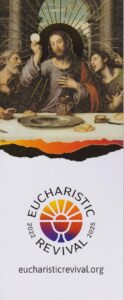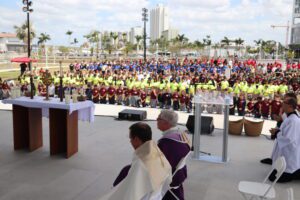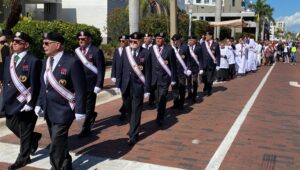The National Eucharistic Revival has entered its second year and as planned shifted its focus to Parish level. It is expected that Parishes will increase the Eucharist’s visibility in their communities through an increase in Eucharistic processions and adoration.
Launched as an initiative of the U.S. Catholic Bishops in June 2022, the National Eucharistic Revival is a three-year movement that aims to deepen Catholics’ love for Jesus through encountering him in the Eucharist. The Revival’s second year leads up to a National Eucharistic Congress in Indianapolis in July 2024. Having enkindled a missionary fire in the hearts of the American faithful, the Holy Spirit will send the faithful out on mission to share the gift of our Eucharistic Lord as we enter the universal Church’s jubilee year in 2025.

Bishop Andrew H. Cozzens of Crookston, Minnesota, chairman of the U.S. Conference of Catholic Bishops’ (USCCB) Committee on Evangelization, and the chairman of the Bishops’ advisory group for the Revival, spoke about the Revival during the June Plenary Assembly of the USCCB in Orlando. Bishop Cozzens outlined how the “small group initiative” in the Parish Year could help deepen people’s relationship to Christ in the Eucharist.
“We all know how much our Church needs to move from maintenance to mission … this is really the heart of what we’re attempting to do,” he said.
In the Diocese of Venice, Bishop Frank J. Dewane and the Office of Evangelization staff have worked hard to help promote the National Eucharistic Revival and plans are in the works to have a unified effort at the Parish level.

“This is a time to grow deeply in your faith, along with others from the Diocese, accompanied by Jesus Christ,” Bishop Dewane said of the Parish Year. “It is in a precise way, in the Eucharist, the Lord is given to us, and we receive Him. We must also have the strength to spend time in front of the Eucharist. Let the strength that Jesus Christ is; let His presence in the Eucharist, fill your heart, fill your mind, fill your soul. Let these dimensions evidence Christ’s indication of what it is He desires from you and for you to accomplish in your life.”
Parish leaders seeking guidance for the National Eucharistic Revival’s Parish Year now have a 24-page resource to assist their discernment. The “Leader’s Playbook,” released in May, helps Parishes answer the question “what are we being asked to do?” through four “invitations” for the Year of Parish Revival, which began on the solemnity of Corpus Christi June 11, 2023.

To allow better accessibility for all (individuals, families and Parishes) to become part of the Revival, these educational resources can be found at the Diocese of Venice website at https://dioceseofvenice.org/eucharistic-congress/year-of-parish-revival/. This includes resources, available in both English and Spanish, for: Pastors and Parish leaders; teachers and Directors of Religious Education; Children and/or those teaching children; teenagers; young adults; not so young adults; and more. Updated monthly, the links from the site are to informational videos, documents, websites and other information.
The playbook was created primarily for Pastors and Parish leaders. Based on the Revival’s four “pillars,” the playbook’s “four invitations” for the Year of Parish Revival are reinvigorating worship, personal encounter, robust faith formation and missionary sending.
“Parishes can use this manual to strengthen their Eucharistic culture and share the gift of the Eucharist with all people, regardless of where they are on their faith journey,” Bishop Cozzens said.

The Revival’s first year was titled “The Year of Diocesan Revival,” with efforts focused on formation for diocesan leadership and Diocesan-wide events. Within the Diocese of Venice, a Eucharistic Congress and Youth Rally took place March 24-25, 2023, in Fort Myers, when Bishop Frank J. Dewane welcomed more than 4,500 to the event.
The Eucharistic Congress, with a theme “The Word Made Flesh,” encompassed several parts, including three unique sessions. The first was for Diocesan Catholic middle school students; the second part was a Youth Rally for high-school aged teens; and the showcase event was for adult men and women and featured special breakout sessions in English and Spanish as well as for men and women.
A major component of the Congress was the celebrateion of the Mass. In addition, there was private and public Eucharistic adoration, and for the main conference for adults, a Eucharistic procession, led by Bishop Dewane, around the event facility in downtown Fort Myers.
The Revival’s second year, “The Year of Parish Revival,” aims to reach Catholics in their Parishes through renewed attention to the “art” of the Mass, Eucharistic devotions, and small-group faith sharing and formation.
Eucharistic processions — which consist of the Eucharist, typically displayed in a monstrance, followed by the faithful for any length of distance inside or outside of a church — became common forms of public devotion for Catholics at points in the Church’s history when the teaching on the Real Presence was questioned. Catholics believe the Eucharist truly is the body, blood, soul and divinity of Jesus Christ, who instituted this Sacrament at the Last Supper.
David Spesia, executive director of the Committee for Evangelization and Catechesis at the USCCB committee spearheading the Revival said, “the goal is really this encounter with Jesus in the Eucharist, and to understand that, when He promised He was with us always, the most unique and precious way that happens is with the gift of the Eucharist and the celebration of the Mass.”
The National Eucharistic Revival will culminate in the first National Eucharistic Congress in the United States in almost 50 years. More than 80,000 Catholics are expected to join together in Indianapolis for a once-in-a-lifetime pilgrimage in a celebration of our Catholic Faith in July 2024.
Our Sunday Visitor contributed information to this report.





